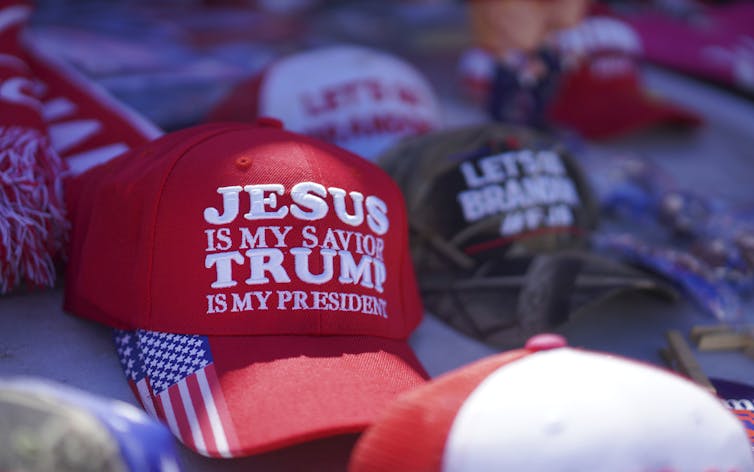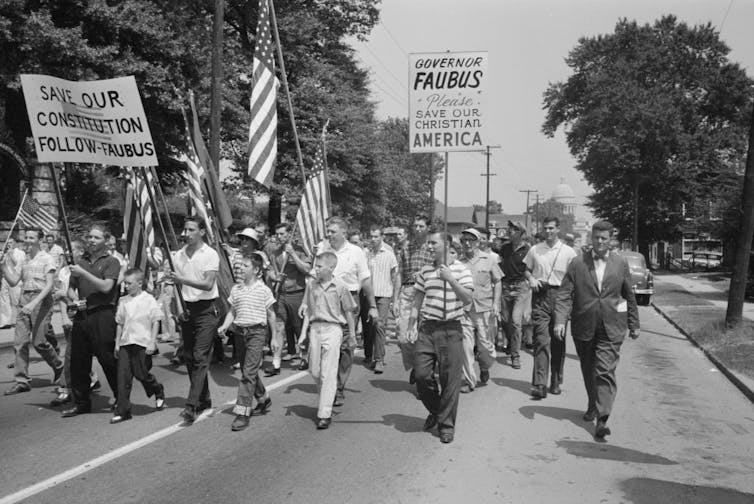(The Conversation) — President Donald Trump and members of his administration have long used allegations of anti-Christian discrimination as a rallying cry for supporters, arguing that policies and laws on issues like school prayer and LGBTQ+ rights threaten Christians’ right to express their beliefs.
Weeks into his second term, Trump took action, signing an executive order on “Eradicating Anti-Christian Bias.” The order vowed to “protect the religious freedoms of Americans and end the anti-Christian weaponization of government” by identifying anti-Christian conduct and recommending policy changes. In mid-April, Secretary of State Marco Rubio instructed employees in the State Department to report any incidents of such bias that occurred during the Biden administration.
Many critics contest claims of widespread discrimination against Christians in U.S. society, given that Christians are the country’s largest faith group and benefit from associated privileges. Consider how Christmas is recognized as a federal holiday, whereas other faiths’ major holidays are not.
As social psychologists, we were curious who claims of anti-Christian bias appeal to, and how those claims are perceived.

Hats for sale at a campaign rally for Donald Trump in Vandalia, Ohio, on March 16, 2024.
AP Photo/Jessie Wardarski
Our 2024 research, as well as other scholars’ work, suggests that people’s beliefs about anti-Christian discrimination are tied with their attitudes about race. These studies suggest that when politicians talk about anti-Christian bias, it does more than signal a concern and commitment to Christians – it can also serve as a signal of white solidarity.
A changing America
Even though they remain the largest religious and racial groups, white Americans and Christian Americans have both declined as a proportion of the U.S. population. Over the past two decades, the percentage of Christian Americans has decreased from 78% to 63%, and the percentage of white Americans has decreased from 69% to 60%. White Christians now account for less than 50% of the country.
Many scholars have argued that, at the root, some white and Christian Americans feel threatened by these demographic shifts. Increasing secularization and other cultural changes have added to some white Christians’ sense that their identity is under attack. According to FBI data, however, only 3% of hate crimes over the past five years targeted Christians. In comparison, 14% targeted Jews, Muslims or Sikhs – groups that make up just 3% of the population.
<p
In his executive order, Trump echoes these perceptions of threat, painting a picture of embattlement for Christians.
The executive order provides examples of charges brought against Christian pro-life protesters and alleges that Democrats failed to respond to attacks on churches. The executive order criticizes the Biden administration for policies that it says “force Christians to affirm radical transgender ideology against their faith,” including for potential foster parents.
Testing views
Historically, white people and Christians were often treated as the quintessential Americans – meaning race and religion are tightly connected in U.S. culture.
Sixty-two percent of white American adults identify as Christian, and 61% of American Christians identify as white.

Marchers protest school integration in Little Rock, Ark., in 1959. One of their signs says ‘Please save our Christian America.’
Bledsoe/Library of Congress/Interim Archives/Getty Images
In our four experiments, published in Psychological Science in March 2024, we tested these connections between views of race and religion, focusing on claims about anti-Christian bias.
First, in two online experiments of about 3,000 participants, we randomly assigned white and Black Christians to one of four groups. One group did not read anything, while the other three were each given a brief blurb about discrimination. Each blurb summarized a different group’s fears that bias against them was increasing: white Americans, Black Americans and Christian Americans.
Afterward, we asked all the participants to assess how much bias they think those groups actually face. Compared to white Christians who did not read anything, white Christians who read the blurb about anti-Christian bias perceived greater anti-white bias. Black Christians who read the blurb about anti-Christian bias, however, did not perceive greater anti-white bias than Black Christians who did not read anything.
Thus, it appears that the white Christians mentally linked anti-Christian and anti-white bias.
In our other two experiments, we randomly assigned about 1,000 white and Black Christians to read an interview excerpt from a fictional local politician who was asked about the most pressing issue in their community. The politician either voiced concern about anti-Christian bias, anti-white bias, religious freedom or the economy.

What are you worried about?
microgen/iStock via Getty Images Plus
Afterward, we asked participants several questions about the politician, including whether they thought this figure was liberal or conservative, and whether they thought this figure would be “concerned about bias against white people.” Black and white Christian respondents believed the politician who voiced concern about anti-Christian bias was also more likely to fight for the rights of white people, relative to the politician who discussed the economy.
We also asked participants whether they found the politician’s interview offensive. Both Black and white Christians viewed the message about anti-Christian bias as less offensive than the message about anti-white bias.
Importantly, these effects held regardless of whether participants believed the politician was conservative or liberal.
Taken together, these findings suggest that expressing concern for anti-Christian bias can be interpreted as signaling allegiance to white people – without the social cost of being accused of racism. Instead, allegations of anti-Christian bias can be presented in a positive way as issues of “religious freedom,” a core American value.
Whether intentionally or not, it seems that rallying around anti-Christian bias can serve as a “dog whistle” signaling support for people concerned about changes in America’s racial makeup, as well.
Clara L. Wilkins and Rosemary (Marah) Al-Kire do not work for, consult, own shares in or receive funding from any company or organization that would benefit from this article, and have disclosed no relevant affiliations beyond their academic appointment.
(Rosemary (Marah) Al-Kire, Postdoctoral Research Associate, University of Washington. Clara L. Wilkins, Associate Professor of Psychology, University of Washington. Michael Pasek, Assistant Professor of Psychology, University of Illinois Chicago. The views expressed in this commentary do not necessarily reflect those of Religion News Service.)
